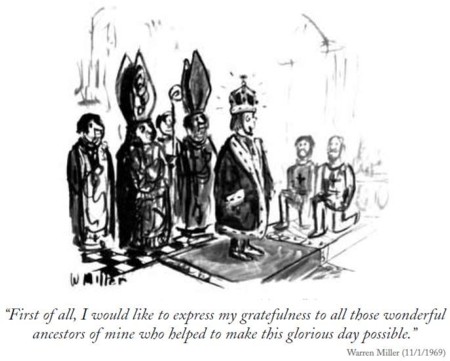Why are we here?
We're here because
We're here because
We're here because we're here;
...repeat for the rest of the tune[85]
Seen from the past, it is impossibly unlikely that you would be here. For you to be born and not a brother or a sister, your mother had to get pregnant and it had to be just that sperm and that ovum that would become you and not your sister or brother. An average ejaculation releases over 59 million sperm; only one of which can fertilise a receptive egg. Which that will be is sensitive to the slightest change in conditions and timing.
It was, in the same way, very unlikely that your mother or father would be who they are. It was quite improbable that our parents would meet at the right times or be attracted to each other or get together at just the right times to have us. The same goes for our grandparents and their parents and grandparents.

If we go back each event in history was also impossibly unlikely. For example it is perfectly possible that an intelligent animal other than humans would have filled this ecological niche. Had a meteor not hit the world (if that is what happened) then the eventually evolving intelligent animal might have been a reptile. Maybe without the various disasters the world has gone thorough there would be no place for intelligence.
We have been identifiably human for around 5,000 generations. Everyone has four grandparents; eight great-grandparents; thirty-two great-great-great-grandparents and so on cumulatively. In only fifty generations (just under a thousand years ago) everyone has theoretically had 2,251,799,813,685,250 ancestors, assuming no interbreeding.
This number is over seven million times greater than the total number of humans that were alive on the planet in 1000 AD. Because of this we know that we must be descended from our shared ancestors by many different lines (many of the couples were distant, or not so distant, cousins).
It would be tempting to argue that every one of us must be descended from everyone on the planet that was alive in the year 1000 seven million times over; or that by two thousand years ago the number is so large that everyone is related to anyone you like to mention (Julius Caesar, Nero or Jesus). But this is clearly not the case. As recently as five hundred years ago groups of humans were still very isolated in particular countries, villages etc and in many places had strong taboos against interbreeding with other races and even with other classes.
It is quite common for quite small communities to be isolated for many generations and some of our ancestors certainly came out of such isolated areas. Further, many people were unable to reproduce or were forbidden to reproduce. As recently as one hundred years ago, working class girls in service in England were forbidden to have children.
Nevertheless the fact that you are here means that your ancestors were amongst those who did reproduce. In the past wealthy and powerful people reproduced more successfully than the poor and weak. People with European ancestors are almost certain to be related to one or many early European kings, queens and landowners.
Almost anyone with an ancestor who was born in Australia before 1940 (when large scale immigration began) will have at least one aboriginal ancestor. Similarly anyone sharing a language will share at least one relatively recent ancestor. Because of the huge number of ancestors you have you are closely related to many people you may see in the street, or even meet overseas.
Because some of our ancestors did not breed or had children who did not, the others had correspondingly more influence on our existence. As we have seen the impact of this accident is well over than a million-fold after only a thousand years.
It is obvious that your presence is contingent on many hundreds of millions of successful copulations. And if just one of these ancestors who produced many lines had mated at a different microsecond or had a slightly different experience, a vast section of the population would not exist as they do. Someone would have existed in their place but not these particular people with these genes.
Every one of these events seems to have been an incredible accident.
This is a mystery that has worried thinkers since humans were smart enough and knew enough to understand the problem; how is it that I am here, thinking these thoughts, when my existence is impossibly unlikely?
It seems I am here by an infinitely small chance, but here I am. Everything else here seems just as unlikely and many of them are just as complex, like a grasshopper, and work so well.

